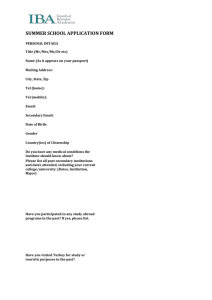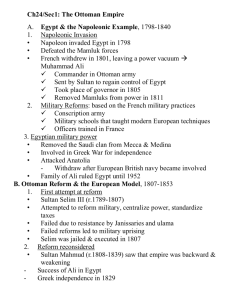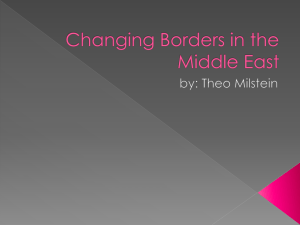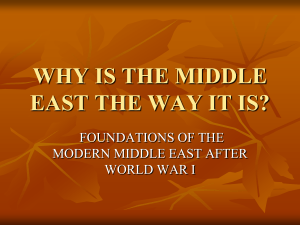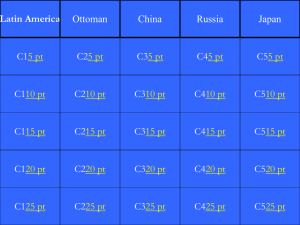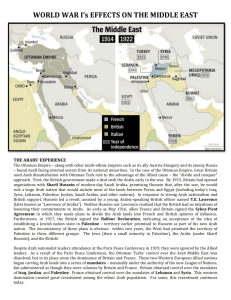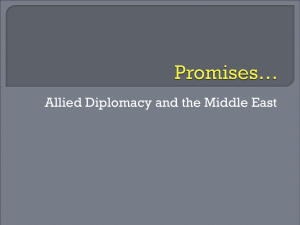Hist161
advertisement
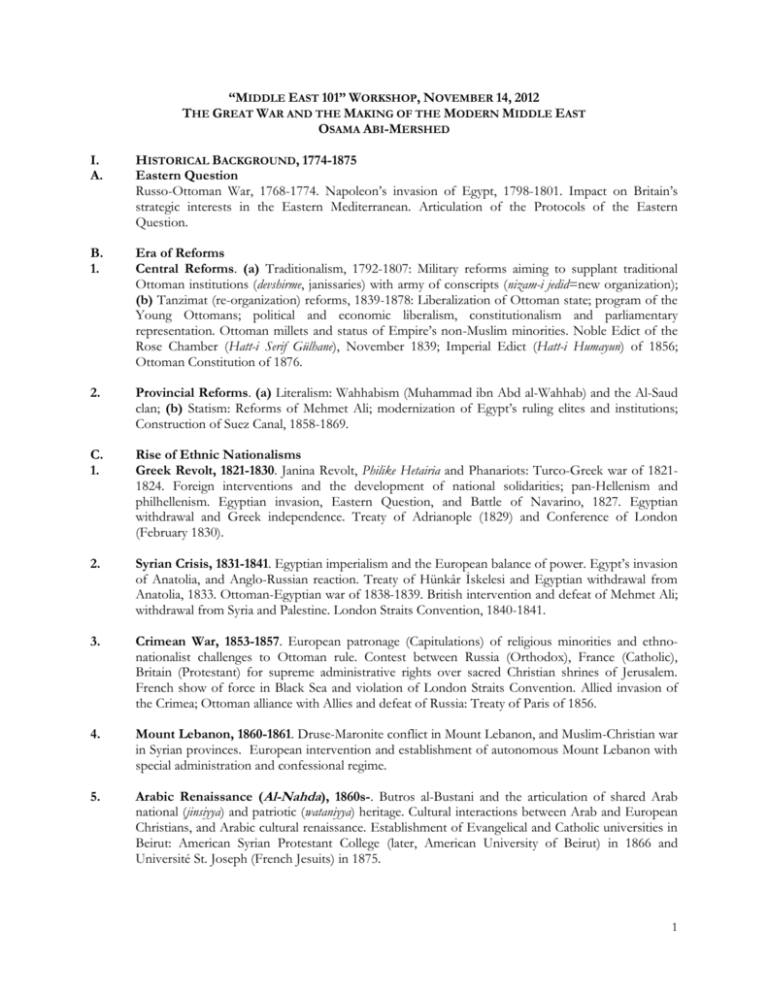
“MIDDLE EAST 101” WORKSHOP, NOVEMBER 14, 2012 THE GREAT WAR AND THE MAKING OF THE MODERN MIDDLE EAST OSAMA ABI-MERSHED I. A. HISTORICAL BACKGROUND, 1774-1875 Eastern Question Russo-Ottoman War, 1768-1774. Napoleon’s invasion of Egypt, 1798-1801. Impact on Britain’s strategic interests in the Eastern Mediterranean. Articulation of the Protocols of the Eastern Question. B. 1. Era of Reforms Central Reforms. (a) Traditionalism, 1792-1807: Military reforms aiming to supplant traditional Ottoman institutions (devshirme, janissaries) with army of conscripts (nizam-i jedid=new organization); (b) Tanzimat (re-organization) reforms, 1839-1878: Liberalization of Ottoman state; program of the Young Ottomans; political and economic liberalism, constitutionalism and parliamentary representation. Ottoman millets and status of Empire’s non-Muslim minorities. Noble Edict of the Rose Chamber (Hatt-i Serif Gülhane), November 1839; Imperial Edict (Hatt-i Humayun) of 1856; Ottoman Constitution of 1876. 2. Provincial Reforms. (a) Literalism: Wahhabism (Muhammad ibn Abd al-Wahhab) and the Al-Saud clan; (b) Statism: Reforms of Mehmet Ali; modernization of Egypt’s ruling elites and institutions; Construction of Suez Canal, 1858-1869. C. 1. Rise of Ethnic Nationalisms Greek Revolt, 1821-1830. Janina Revolt, Philike Hetairia and Phanariots: Turco-Greek war of 18211824. Foreign interventions and the development of national solidarities; pan-Hellenism and philhellenism. Egyptian invasion, Eastern Question, and Battle of Navarino, 1827. Egyptian withdrawal and Greek independence. Treaty of Adrianople (1829) and Conference of London (February 1830). 2. Syrian Crisis, 1831-1841. Egyptian imperialism and the European balance of power. Egypt’s invasion of Anatolia, and Anglo-Russian reaction. Treaty of Hünkâr İskelesi and Egyptian withdrawal from Anatolia, 1833. Ottoman-Egyptian war of 1838-1839. British intervention and defeat of Mehmet Ali; withdrawal from Syria and Palestine. London Straits Convention, 1840-1841. 3. Crimean War, 1853-1857. European patronage (Capitulations) of religious minorities and ethnonationalist challenges to Ottoman rule. Contest between Russia (Orthodox), France (Catholic), Britain (Protestant) for supreme administrative rights over sacred Christian shrines of Jerusalem. French show of force in Black Sea and violation of London Straits Convention. Allied invasion of the Crimea; Ottoman alliance with Allies and defeat of Russia: Treaty of Paris of 1856. 4. Mount Lebanon, 1860-1861. Druse-Maronite conflict in Mount Lebanon, and Muslim-Christian war in Syrian provinces. European intervention and establishment of autonomous Mount Lebanon with special administration and confessional regime. 5. Arabic Renaissance (Al-Nahda), 1860s-. Butros al-Bustani and the articulation of shared Arab national (jinsiyya) and patriotic (wataniyya) heritage. Cultural interactions between Arab and European Christians, and Arabic cultural renaissance. Establishment of Evangelical and Catholic universities in Beirut: American Syrian Protestant College (later, American University of Beirut) in 1866 and Université St. Joseph (French Jesuits) in 1875. 1 II. A. Great Eastern Crisis, 1875-1881 Revolution, Nationalism and Imperialism Eastern Question in wake of German unification (1864-1871) and post-Crimea Russian imperialism. Russo-Ottoman War of 1877. Collapse of Ottoman economy, 1876-1877. Congress of Berlin, JuneJuly 1878. Territorial settlements and high tide of European imperialism. Reactionism of Sultan Abdul Hamid II: suspension of Ottoman Parliament and Constitution; end of liberalization reforms (Tanzimat); emphasis on pan-Islamic policies; clampdown on Arab nationalist groups and proEuropean elements, suspension of Arab press and schools. B. 1. Birth of Islamism Accumulation of debt and bankruptcy of Egypt, 1876-1877. France, Britain and Public Debt Commission (PDC). Popular discontent, constitutionalist movements, and uprising of “Egypt for Egyptians” movement, 1879. Rise of Colonel Ahmad Urabi. Confrontation with Britain over PDC. British bombardment and occupation of Alexandria, 1881. Defeat of Urabi at Tel el-Kebir, 13 September 1882. British occupation of Egypt. 2. Ideological principles of Islamic Revivalism. (a) Jamal al-Din al-Afghani and Muhammad Abduh. Salafism: Establishment of social order based on founding political principles of Islam, as instituted and practiced by Prophet Muhammad and first converts (al-salaf). Emphasis on individual reasoning (ijtihad) and communal or public interest (maslaha) in implementing Muslim law (shari‘ah) and modernizing Muslim societies. (b) Rashid Rida’s counter-modernity: pitfalls and contradictions of European universalism. Technology, modernity and purification of the Muslim faith. Break with Abduh and splintering of Islamic Revivalist ideology. III. A. Political Realignments, 1881-1914 Pax Britannica Collapse of traditional politics of Eastern Question and Britain’s post-1882 eastern strategy. GermanOttoman rapprochement: Berlin-Baghdad Railway and German designs on Persian Gulf. Abdul Hamid’s pan-Islamism and Hijaz Railway project. Conference of Berlin of 1884-1885. European partitioning of Africa. Entente Cordiale, 1904. B. Arabian Peninsula and Persian Gulf Anglo-Russian stand-off in Persian Gulf and Iran. (a) Iran: Foreign concessions and Tobacco Protest of 1891. Revolution of 1905 and establishment of constituent assembly (majlis). Fundamental Laws of 1907. Discovery of petroleum reserves in Abadan, 1908. Anglo-Russian intervention, counter-revolution and restoration, 1908-1909. Occupation and partitioning of Iran. (b) Arabia: Britain’s alliance with Abd al-Aziz ibn Saud. Wahhabi conquest of province of Hasa, 1913. Province of Basra and Ottoman access to Persian Gulf. Expansion of Kuwait into southern Iraq. C. 1. Birth of Political Zionism European Jewry and the nation-state. Status of Jews in post-Enlightenment Europe: individual vs. communal rights. Anti-Jewish pogroms and emergence of Zionist movement: redefinition of Jewish populations as political entity; constitution of territorially-defined nation-state; sponsorship of largescale Jewish immigration to Palestine (alya). Publication of Theodor Herzl’s Der Judenstaat. First Congress of World Zionist Organization (Basel, 1897). 2. Local Reactions to Zionism. Arab intellectuals on Zionism. Second alya (1910s), suspension of use of Palestinian laborers, and first Palestinian-Zionist confrontations. Creation of socialist economic collectives and development of kibbutzim. Young Turk opposition to Zionist immigration. 2 IV. A. 1. THE GREAT WAR, 1914-1919 Theaters of Military and Political Operations British Reversals, 1915-1916. Ottoman failure in Egypt (Suez Canal); British surrender in Iraq (Kut al-Amara, April 1916). Assault on Straits of the Dardanelles, defeat at Gallipoli and withdrawal. Russian counter-offensive. Armenian massacre. October Revolution of 1917. Treaty of BrestLitovsk. Young Turks (Enver Pasha, Jamal Pasha, Talaat Pasha) and Arab nationalists. 2. Caucasus Front and Armenian Massacre Annihilation of Ottoman Third Army (Enver Pasha), January 1915. Russian advances in Anatolian heartland, May 1915. Proclamation of independent Armenian Republic of Van. Expulsion and transfer of Armenians communities of eastern Anatolia to northern Syria. Terror campaign, massacre of civilians. October Revolution of 1917; Treaty of Brest-Litovsk (April 1918); restoration of Russian-Ottoman borders of 1876. 3. Political Repression of Arab Nationalists CUP clampdown on Arab secret societies al-Fatat and al-Qahtaniyya. Jemal Pasha’s round-up of SyroLebanese notables. Elimination of political leadership of Syria and Lebanon. Re-orientation of British anti-Ottoman efforts towards the Hijaz. Arab Revolt, 1916-1918. B. 1. Political and Diplomatic Maneuvers Husayn-MacMahon Correspondence, 1915-1916. Secret correspondence between British High Commissioner in Egypt and Sharif Husayn. Ambiguities of terns and engagements. 2. Sykes-Picot Accord and Arab Revolt. Faysal ibn Husayn and T.E. Lawrence. Details of secret agreement between France, Britain, and Russia; development of plans for partitioning Ottoman Empire. 3. Balfour Declaration, November 1917. Britain’s official sponsorship of a Jewish national homeland in Palestine. 4. Faysal-Weizmann Accords, 1919. Absence of Arab delegations to Paris. Britain’s brokered agreement between Faysal and Chaim Weizmann (Dec. 1918). Ambiguities in definition of Jewish national homeland. Large-scale anti-British demonstrations in Palestine. 5. King-Crane Commission, 1920. Dispatch of fact-finding commission under Henry King and Charles Crane to ascertain local political demands in former Ottoman provinces. Results of petitions. Withdrawal of US from Peace Conference. Ratification of Treaties of Versailles and beginning of partitioning of Ottoman Empire by France, Britain, Italy, and Greece. V. A. SPOILS OF WAR: PARTITIONING OF THE OTTOMAN EMPIRE, 1919-1924 France and the Arab Kingdom British evacuation and French occupation of Lebanon. Declaration of independent Kingdom of Syria under Faysal. French ultimatum and invasion of Syria. Battle of Maysalun and capture of Damascus, July 1920. End of Arab Kingdom: creation of Greater Lebanon, 1923 and partition of Syria. B. New British Imperialism: Iraq and Palestine Transfer of Faysal to Baghdad and appointment as King of the British mandate Iraq: composed of Vilayet of Mosul (Sunni Kurds), Vilayet of Baghdad (Sunni Arab), and Vilayet of Basra (Shiite Arab). Creation of Kingdom of Transjordan under Abdallah. Question of Palestine not resolved. 3 C. Treaty of Sèvres De facto recognition of military occupation of Anatolia by signatories to Sykes-Picot. November 1918, Allied forces and Greece move into Anatolia to establish zones of control: French and British forces occupy Istanbul, French in Cilicia, Italians in Antalya, Greeks in western Thrace and Smyrna. Independent Armenian state and autonomous Kurdish province in eastern Anatolia. Treaty of Moscow with Bolsheviks. Greco-Turkish War: victory of Turkish forces under Mustafa Kemal, retreat of Allied power, and defeat of Greece. Transfer of populations, massive deportations, and forceful resettlement of Greeks and Turks. November 1922: Mustafa Kemal, Ataturk, abolishes Ottoman Sultanate and establishes Turkish Republic in Ankara. International recognition of new borders with Treaty of Lausanne (24 July 1923). Turkey renounces claims to former Ottoman territories outside new boundaries and guarantees rights of minorities within its state. 4
